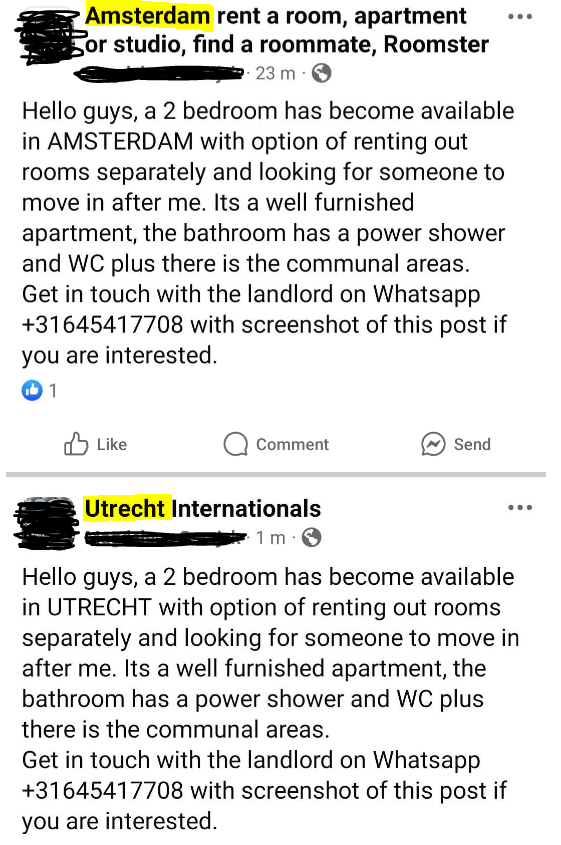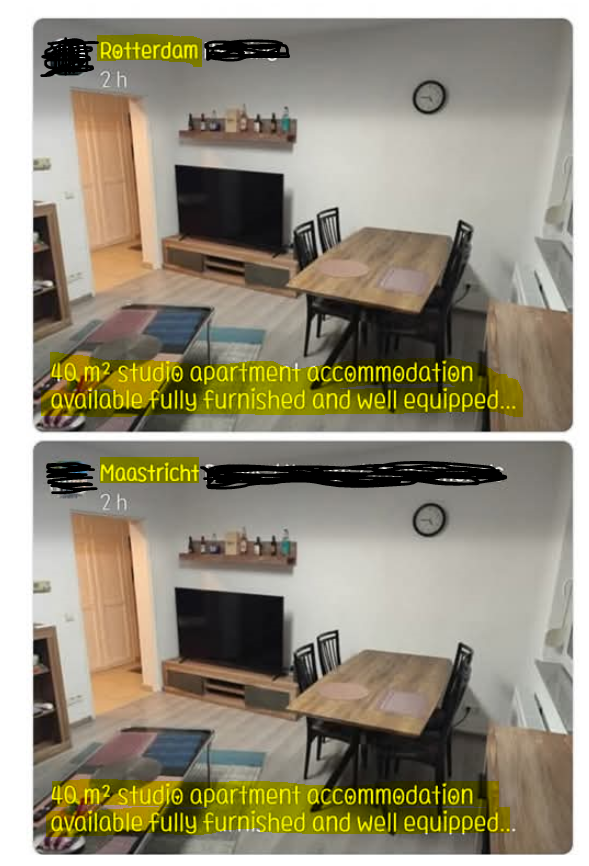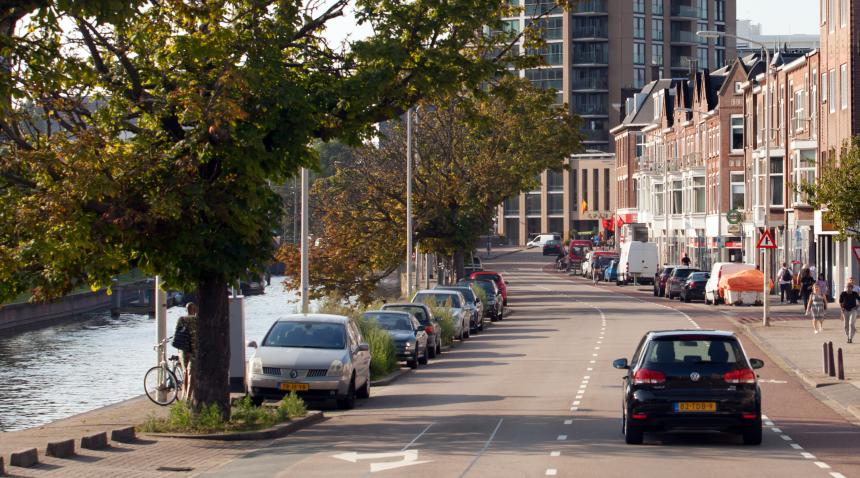
Smart Checks
Affordable housing in The Hague is limited, and the search can be challenging, especially if you're in a hurry or looking from abroad. While most people eventually find a place in The Hague or nearby cities like Delft, Leidschendam-Voorburg, or Rijswijk, it takes time and focus. That focus is crucial, because scammers often target those under pressure. To help you avoid costly mistakes, here are some tips to spot and steer clear of housing scams or avoid unfair practices by landlords.
Smart Checks for Finding an Affordable Home
Begin Your Search with Online Listings
As properties tend to go quickly and websites may not always be up to date, some people use RentSlam, an app (a paid service) that scans multiple rental platforms and alerts you as soon as a property matching your criteria becomes available. We are not affiliated with RentSlam, so we advise using it at your own discretion. Importantly, listings found via RentSlam are not automatically trustworthy, always verify the details carefully to avoid potential scams.
Funda and Pararius are the largest platforms for both rental and purchase properties. For affordable student accommodation, commonly used websites include ROOM and DUWO. While these platforms are widely used, they are not immune to fraudulent listings, so it is essential to carry out your own checks.
If you’re a student, consult the international desk of your university. Some universities offer a housing helpdesk that can assist in verifying the legitimacy of a listing.
Respond First, Verify Second
It’s often best to reply to a promising listing straight away, as properties can go fast. However, make sure to check the details as soon as possible to confirm the listing is legitimate. Use tools like Google Reverse Image Search to spot reused photos, and search the ad text to see if it appears elsewhere. Be aware of scams as listed in the example below.
Facebook groups such as Dutch Housing Experience & Scammers Exposed may help identify scams, though we’re not affiliated, so use at your own discretion.
Check Google Maps to confirm the property exists and isn’t an office building. Cross-check the address with Street View images to verify the surroundings match the listing. Look for visual clues in the photos to confirm the property is located in the Netherlands. These may for example include Dutch-style power outlets, the absence of water dispensers (as tap water is commonly used in the Netherlands), typical Dutch garden plants, and local vehicle number plates. Such details can help you assess whether the listing is genuine and accurately represents a Dutch home.
View the Property Before Committing
If the initial checks look fine, arrange a viewing as soon as possible. If you’re searching from abroad, try to arrange for someone you trust to view the property on your behalf. If that’s not possible, request a video call with the landlord or agent. Be sure they show you the exterior of the property, including the street and front entrance, so you can compare it with images on Google Street View. This can help verify that the listing matches the actual location.
Avoid moving forward if a viewing isn’t possible, no matter how appealing the property or convincing the excuse.
Check Ownership and Rent Legitimacy
After a successful viewing, look into the landlord or agency by searching their name online and checking for reviews or complaints. Confirm that the landlord owns the property via the Dutch land registry.
If possible, ask for a copy of their ID, though this isn’t mandatory, and refusal isn’t necessarily a red flag unless you already have doubts. Keep in mind that if you're renting directly from a private landlord (without an estate agent), you may be asked to provide a copy of the landlord’s ID when registering with the municipality.
Review rent price if it seems too high
If the rent seems too high, you can request a rent check through the Rent Tribunal (Huurcommissie) within six months of your contract start date. They’ll assess whether the rent should be reduced. If so, the new rate applies from the start of your agreement. Be aware this process may affect your relationship with the landlord.
Red Flags
Too Good to Be True
A spacious apartment in a prime location for € 500,- a month does not exist. Scam listings often look convincing. They include overly detailed descriptions, long lists of appliances, and resemble Airbnb ads with fully furnished interiors and all utilities included.
Same photo used for different apartments
Be cautious: reverse image searches often reveal the same photos used in listings from other cities or countries.Be aware of scams as listed in the example below.
No viewing
You are denied a viewing. This should always be considered a red flag.
Key Sent by Post
In the Netherlands, it's customary to hand over keys in person, usually during a viewing or when signing the rental contract. If you're told the key will be posted, consider it a red flag. Request an in-person key handover, or reconsider moving forward with the listing.
Email-Only Contact
A landlord who only communicates via email and provides no phone number isn’t necessarily suspicious, as long as they respond promptly. But if you already have doubts, consider this a warning sign.
No Registration Allowed
If a landlord says you can’t register at the address, be wary. Registration with the municipality is legally required if you stay in the Netherlands for at least 4 months. Without it, you can’t register as a resident (obtain a BSN), which could also have consequences for your residence permit. If the landlord refuses registration, this could indicate an unlawful rental arrangement.
No Written Rental Agreement
A verbal agreement makes it hard to prove what was agreed if issues arise. Note that under the Good Landlordship Act (in effect since 1 July 2023), landlords are legally required to provide a written rental agreement.
You will be asked to present a rental agreement when registering with the municipality. Be sure to check the ‘Good To Know’ section on this page for guidance on what information should be included in a rental agreement. If key details are missing, especially if you already have doubts—this could be a warning sign. Always review the contract carefully before proceeding.
Pay Deposit Before Signing
Paying a deposit before signing a rental contract is risky. If it’s a scam, you could lose both your money and the property (if there ever was one). Best practice is to pay only after signing the rental contract, for example together with the 1st months’ rent. Never pay for a property you haven’t seen in person.
Unusual or Suspicious Payment Requests
Rent and deposit payments should only be made via bank transfer to an IBAN account. If you are asked to pay in cash, or to transfer funds to a foreign bank account, or via services such as PayPal or Western Union, this may be a sign of a potential scam.
To protect yourself, always ensure that payments are made to a verified IBAN account. You can use the IBAN checker to confirm the validity of the account number before making any transfers.
Asked for ID Too Soon
If you're asked to send a copy of your ID early in the process, or to share sensitive personal details, be cautiouS, this might mean someone is trying to misuse your personal information. For example, landlords are not allowed to ask for your BSN, unless a specific law permits it. The Dutch Data Protection Authority (DPA) provides clear guidance on what personal data landlords can request and when. Always verify before sharing sensitive information.
Good To Know
Expectations
Dutch homes, particularly in cities such as The Hague, are often compact in design. You can expect features like narrow staircases, limited outdoor space (such as small balconies), no air conditioning, and the possibility of noise from neighbouring properties. Being aware of these typical characteristics can help set realistic expectations when beginning your apartment search.
Pre-inspection
Once you've been accepted as a tenant, it's a good idea to arrange a pre-inspection of the property to check its condition and take meter readings. This helps ensure the previous tenant has left the home as agreed. After the inspection, you'll sign a handover document confirming you're taking over the property.
Additional Fees
Landlords are not allowed to charge:
- Agency fees (also called mediation or administration fees)
- Contract fees (for drawing up the rental agreement)
- Key money ('sleutelgeld'; a fee just to access the property)
Did you use a rental agency? If you found the property yourself, you should not be charged agency fees. Agencies may only charge a fee if they found the property specifically for you.
Landlords are allowed to ask for a deposit, but for contracts signed on or after 1 July 2023, the maximum is two months’ basic rent.
Landlords may also charge service costs, but only for actual expenses. Under the Good Landlordship Act, they must provide a full breakdown of these costs and cannot keep any surplus.
As a tenant and user of a property, you will receive a local tax assessment every year. Ask your landlord in advance who will be responsible for paying these taxes and whether these are included in the rent.
The Rental Agreement
A rental agreement generally includes the following details:
- Full name and contact details of the landlord
- Full name and contact details of the tenant
- Full name and contact details of the letting agency or housing corporation (if applicable)
- Bank account number used for rent payments
In addition, the agreement should outline:
- The permitted use of the accommodation
- When the landlord may enter the property (only with your consent, except in emergencies)
- The type of tenancy agreement in place, along with information on tenant rights and rent regulation
- What steps to take if the property requires repairs
- Who to contact with questions about the accommodation
- Where to turn if issues with the landlord cannot be resolved (e.g. the local authority, rent tribunal, or district court)
- The amount of the deposit, and the conditions for its return
- Service charges (an annual overview of these costs must be provided)
For rental contracts signed on or after 1 January 2025, landlords are also required to provide a written point system alongside the rental agreement. This document can be useful when requesting a rent assessment or applying for an affordable housing permit.
Good Landlordship Act
Since 1 July 2023, the Good Landlordship Act has been in effect to protect tenants from unfair practices like excessive deposits, unreasonable service charges, discrimination, and intimidation. Make sure you're aware of your rights as a tenant.
Don’t let this information discourage you, most landlords are genuine, and many tenants find a home without issues. These tips are here to help you make informed choices. If you do fall victim to a scam, don’t feel embarrassed, it can happen to anyone. Report it to the police and contact the Fraud Helpdesk for support. If you choose to work with a rental agent, ensure they are registered with the Chamber of Commerce and preferably affiliated with a recognised trade association. You can find an overview of our partnered real estate agents on our website, as well as information on renting and short-term housing solutions. Make sure to check the step-by-step plan for tenants on the Dutch government website.





